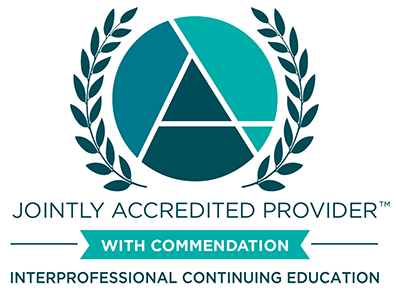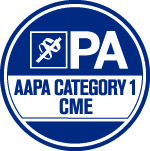Session I: Sexual Wellbeing on Campus - A Seminar Series on Sex Therapy for University Health Services
The stigmatization, sensitivity, and shame of discussing sexual health results in trepidation initiating conversations about sex. Sexual health is the intersection of physical, mental, emotional, and relational health but it tends to be siloed and overlooked. This seminar explores the impact of sexual shame on our work as clinicians and how to incorporate a sex positive approach that truly embodies all aspects of the human experience.
Intended Audience
This activity is designed for physicians, nurses, APPs (PA/NP), social workers, psychologists, and other healthcare professionals working with college students.
Elements of Competence
This CE activity has been designed to improve learner competence and focuses on the Accreditation Council for Graduate Medical Education and American Association of Colleges of Nursing areas of patient care and procedural skills, medical knowledge, practice-based learning and improvement, interpersonal and communication skills, professionalism, providing patient/person-centered care, employing evidence-based care, and population health
This activity also focuses on the Diversity, Equity, and Inclusion competencies of engaging in self-reflection, addressing healthcare disparities and engaging in self reflection.
Learning Objectives
By participating in this activity, members of the healthcare team will be able to...
- Discuss the importance of sexual health, particularly among college-age students, and it’s role in improving mental health outcomes.
- Provide at least two examples of sex positivity in clinical practice.
- Define sex therapy and at least three presenting issues seen with this approach.
- Recall and differentiate the utility of DOUPE and Ex-PLISSIT when assessing sexual health concerns.
- Identify sexual health resources and at least two interventions that can be used in clinical practice.
Policy on Disclosure
It is the policy of the University of Wisconsin–Madison Interprofessional Continuing Education Partnership (ICEP) to identify, mitigate and disclose all relevant financial relationships with ineligible companies* held by the speakers/presenters, authors, planners, and other persons who may influence content of this accredited continuing education (CE). In addition, speakers, presenters, and authors must disclose any planned discussion of unlabeled/unapproved uses of drugs or devices during their presentation.
For this accredited continuing education activity all relevant financial relationships have been mitigated and detailed disclosures are listed below.
Name | Role | Financial Relationship Disclosures | Discussion of Unlabeled/ Unapproved uses of drugs/devices in presentation? |
| Molly Caradonna, PsyD | Course Director | No relevant financial relationships with ineligible companies to disclose | No |
| Sam Troemel, LMFT | Course Director | No relevant financial relationships with ineligible companies to disclose | No |
| Ellen Marks, PhD | Planner | No relevant financial relationships with ineligible companies to disclose | No |
| Ritu Bhatnagar, MD | Planner | No relevant financial relationships with ineligible companies to disclose | No |
| Larissa Gearing-Bundy, RN | Planner | No relevant financial relationships with ineligible companies to disclose | No |
| Beth Adamski, LPC | Planner | No relevant financial relationships with ineligible companies to disclose | No |
| Madelyn Esposito, LPC | Faculty | No relevant financial relationships with ineligible companies to disclose | No |
| Maggie Collins, MA | Faculty | No relevant financial relationships with ineligible companies to disclose | No |
*Ineligible companies are those whose primary business is producing, marketing, selling, re-selling, or distributing healthcare products used by or on, patients.
The ACCME does not consider providers of clinical services directly to patients to be ineligible entities.
 | In support of improving patient care, the University of Wisconsin–Madison ICEP is jointly accredited by the Accreditation Council for Continuing Medical Education (ACCME), the Accreditation Council for Pharmacy Education (ACPE), and the American Nurses Credentialing Center (ANCC) to provide continuing education for the healthcare team. |
CREDIT DESIGNATION STATEMENTSAmerican Medical Association (AMA) The University of Wisconsin–Madison ICEP designates this hybrid live activity for a maximum of 2.0 AMA PRA Category 1 Credits™. Physicians should claim only the credit commensurate with the extent of their participation in the activity. American Nurses Credentialing Center (ANCC) The University of Wisconsin–Madison ICEP designates this hybrid live activity for a maximum of 2.0 ANCC contact hours. | |
 | American Psychological Association (APA) Continuing Education (CE) credits for psychologists are provided through the co-sponsorship of the American Psychological Association (APA) Office of Continuing Education in Psychology (CEP). The APA CEP Office maintains responsibly for the content of the programs. |
 | Association of Social Work Board (ASWB) Approved Continuing Education (ACE) As a Jointly Accredited Organization, the University of Wisconsin - Madison ICEP is approved to offer social work continuing education by the Association of Social Work Boards (ASWB) Approved Continuing Education (ACE) program. Organizations, not individual courses, are approved under this program. Regulatory boards are the final authority on courses accepted for continuing education credit. Social workers completing this course receive continuing education credits. |
 | American Academy of Physician Assistants (AAPA) The University of Wisconsin–Madison ICEP has been authorized by the American Academy of PAs (AAPA) to award AAPA Category 1 CME credit for activities planned in accordance with AAPA CME Criteria. This activity is designated for 2.0 AAPA Category 1 CME credits. PAs should only claim credit commensurate with the extent of their participation. |
Continuing Education Units The University of Wisconsin–Madison ICEP, as a member of the University Professional & Continuing Education Association (UPCEA), authorizes this program for 0.2 continuing education units (CEUs) or 2.0 hours. | |
Available Credit
- 2.00 AAPA Category 1 CME
- 2.00 AMA PRA Category 1 Credit™
- 2.00 ANCC Contact Hours
- 2.00 APA CE Credits
- 2.00 University of Wisconsin–Madison Continuing Education Hours
- 2.00 Approved for AMA PRA Category 1 Credit™

 Facebook
Facebook X
X LinkedIn
LinkedIn Forward
Forward